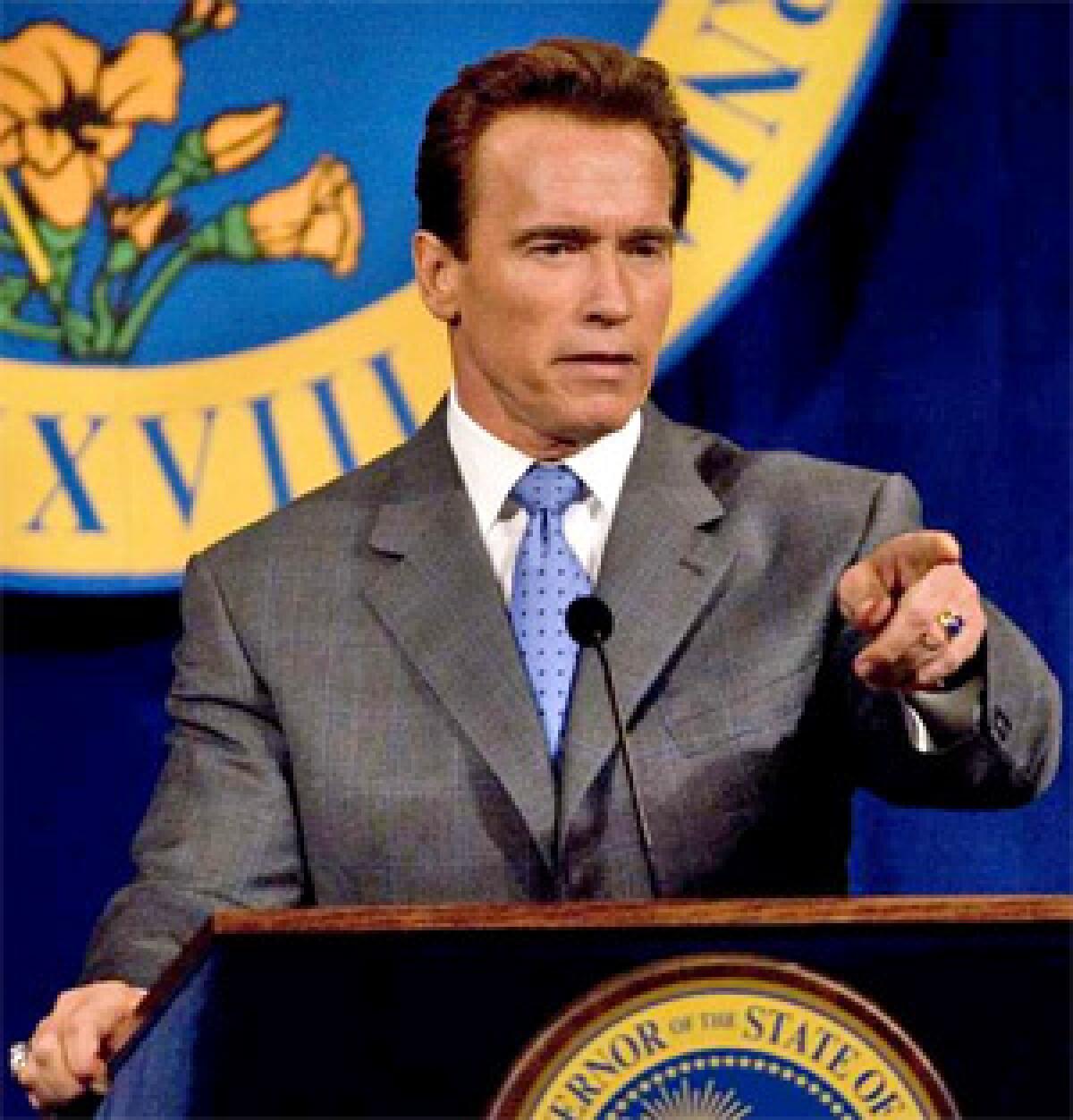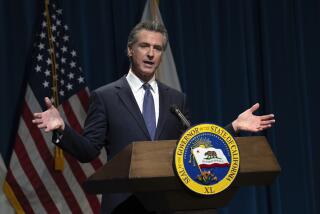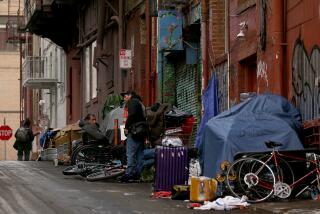‘Wolf is back’ at state budget door

Returning to policies he advanced without success early in his tenure, Gov. Arnold Schwarzenegger called Tuesday for state government to permanently rein in spending and vowed not to raise taxes next year -- even as he prepared a budget that would increase insurance fees for millions of property owners.
Schwarzenegger, facing a $14-billion deficit, said in his annual State of the State address that he would propose a “difficult” budget Thursday that would hurt many groups, such as AIDS patients, the poor and the elderly. He did not mention that he would also try to raise money for firefighting efforts through a proposal, a copy of which was obtained by The Times, to collect a surcharge from renters, homeowners and business owners who buy property insurance.
The speech lacked the sweep and ambition of the Republican governor’s address a year ago, when he was basking in his reelection, legislative achievements and a budget he said then was under control.
Today, by contrast, Schwarzenegger faces a deficit driven partly by spending increases and borrowing that he oversaw, despite his election on promises to fix California’s chronic fiscal problems once and for all. And as First Lady Maria Shriver watched from a balcony, the normally ebullient governor spoke in somewhat reserved tones.
“For several years, we took actions that balanced the budget as long as the economy was booming,” he said, speaking in the Assembly chamber in midafternoon. “For several years, we kept that budget wolf from the door. But the wolf is back.”
Lawmakers applauded nine times during the 25-minute address, but the mood in the room was generally tepid.
Though subdued, the governor retained his sense of humor, even on serious subjects. He drew laughs saying “Professor Schwarzenegger” would explain the economics of the budget and uttering “Duh!” as he told how a man dying of cancer was cut off from health insurance because he had lost weight since signing up. “Of course he did, because now he was sick with cancer,” the governor said.
The centerpiece of Schwarzenegger’s proposals was a constitutional amendment that would impose a spending cap. He said it would end the “binge and purge” nature of the budget process by automatically reducing expenditures when tax revenues increased more slowly than average. When revenues were flush, it would put extra money aside for the future.
The idea mirrors Schwarzenegger plans that were rejected in 2004 by state legislators and the next year by voters. He has repeatedly decried the state’s “autopilot” spending -- funding guaranteed by legal formulas and state contracts, which his aides said accounts for 87% of the general fund budget.
“When we see a budget problem developing during the year, we don’t have any way to stop it,” he said Tuesday. “We just keep the spending accelerator to the floor. . . . We need some brakes. We need an alternative to crashing.”
His proposal would need approval from both the Legislature and voters. Administration officials said they had made changes from the earlier proposals to reduce potential cuts to guaranteed education money and give lawmakers more power to decide which programs would not be funded. But reaction from Democrats, who control the Legislature, suggested the plan would again face tough going.
“The governor is willing to sell us short,” Senate President Pro Tem Don Perata (D-Oakland) said immediately after the speech. “He is selling us on the excellence of mediocrity. Advocating automatic cuts, but failing to establish the priorities and how to fund them, is political expediency at its best and political leadership at its worst.”
Republicans praised Schwarzenegger for pledging not to support any tax increases and to cut spending. They also had warm words for his spending cap, although in its earlier incarnation some had criticized the idea as having too many loopholes.
“You can’t continue to spend hundreds of millions of dollars every month when you don’t have it,” said Sen. Dick Ackerman (R-Irvine), leader of the Republican senators who blocked passage of the current budget for two months last summer to protest spending levels.
The governor spent nearly the first half of his speech talking about government’s basic responsibility to take care of people, recalling his visits to displaced residents during the recent wildfires, and the state’s response. He singled out Paul Russo, a nurse practitioner taking care of 300 senior citizens. He mentioned the state’s quick repair of a Bay Area freeway after a truck fire in April.
“Government can work,” he said. “It can be efficient. It can lead.”
That view was modest compared with the last two years, when he joined with Democrats to trumpet infrastructure projects as well as expansions in healthcare and education.
Schwarzenegger offered little new Tuesday, instead focusing on ideas he has been talking about, in some cases, for several years. Besides the spending cap, he said he would push for public-private partnerships in state and local construction projects.
He urged lawmakers not to abandon his plan to dramatically expand the state’s healthcare system because of California’s fiscal problems, saying, “Sometimes you have to be daring, because the need is so great.”
A plan he crafted to expand medical coverage to more than 3 million residents passed the Assembly last month but is facing a tough audience in the Senate, where leaders are concerned that it could end up adding to the state’s financial burdens.
The governor had previously designated 2008 as the “year of education,” and a commission he appointed recommended $6.1 billion in new spending in a draft report completed last year. While the governor spoke about improving education, he said there was not funding for it now and embraced few of the commission’s suggestions in his speech.
“Everyone knows that to dramatically change our education system, we have to undertake reforms, and we have to fund those reforms,” Schwarzenegger said. “In light of the current budget situation, of course, this is not the year to talk about money.”
The governor said the state would be the first in the country to intervene in school districts that have failed for five years to meet student achievement levels required by the federal No Child Left Behind Act.
The state plans to work with 98 poorly performing school districts, using millions of dollars of funding and help from state turnaround experts. The districts include L.A. Unified and 33 others in Los Angeles, Orange, Riverside, San Bernardino and Ventura counties.
Depending on the severity of the problems, the state Board of Education will provide varying levels of intervention and make demands for corrective action.
Schwarzenegger also proposed expanding teacher preparation programs and establishing a commission to study how to compile data on different schools.
Dennis Smith, secretary-treasurer of the California Federation of Teachers, said Schwarzenegger’s school proposals were “recycled policies that did not work in the past” and would not deflect attention from the governor’s efforts to reduce school funding in the budget. Schwarzenegger is expected to propose a $1.4-billion cut to current education funding.
“This was billed as the year of education, and it turns out to be the year of cutting education,” Smith said.
Schwarzenegger, without providing details, acknowledged that he “will be submitting a budget that is difficult.”
“Talking about fiscal responsibility sounds so cold when you have a representative for AIDS patients, or poor children or the elderly, sitting across from you. It’s one of the worst things about being governor. Yet fiscal responsibility, like compassion, is a virtue, because it allows the necessary programs in the first place,” he said.
But he spoke in terms that put him at odds with Democrats, who are demanding that the state look at tax increases along with program cuts.
“Californians want a decent quality of life for the elderly, the blind and the disabled,” said Assembly Speaker Fabian Nuñez (D-Los Angeles).
State Sen. Darrell Steinberg (D-Sacramento) said the governor fanned the flames of partisanship by focusing only on spending in his speech.
“The question has to be rephrased: What do we want? What do we need?” Steinberg said. “I fear that without a different and more constructive question being asked, we’re going to come to the same place we always come to, which is a bloody fight that in the end does not solve the larger problem.”
Times staff writers Nancy Vogel, Patrick McGreevy, Jordan Rau, Marc Lifsher and Evan Halper contributed to this report.
More to Read
Start your day right
Sign up for Essential California for news, features and recommendations from the L.A. Times and beyond in your inbox six days a week.
You may occasionally receive promotional content from the Los Angeles Times.






